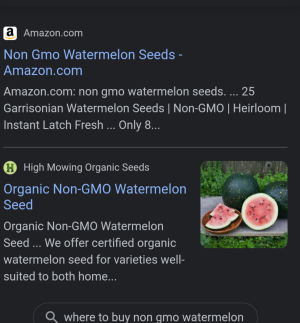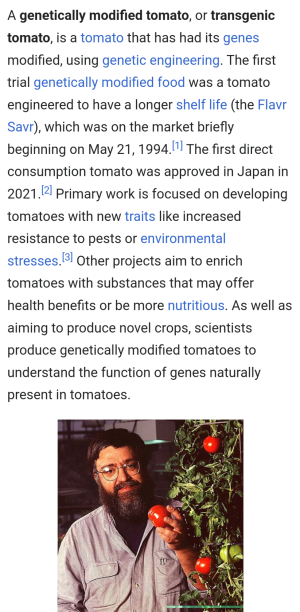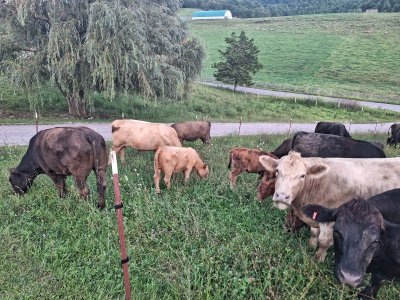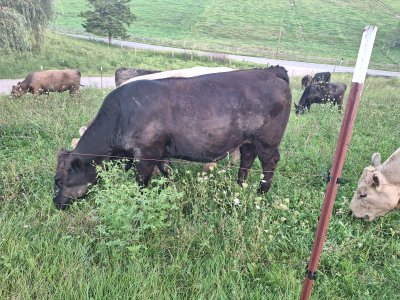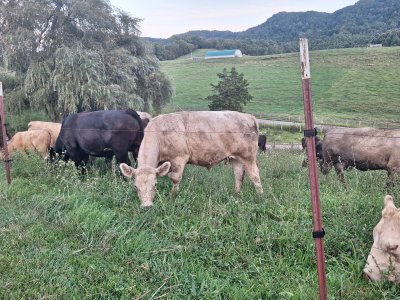You are using an out of date browser. It may not display this or other websites correctly.
You should upgrade or use an alternative browser.
You should upgrade or use an alternative browser.
Farm raised beef
- Thread starter Rockridge
- Start date

Help Support CattleToday:
I'm looking for ranch insurance coverage in the Guthrie/Coyle Oklahoma area. Any suggestions?
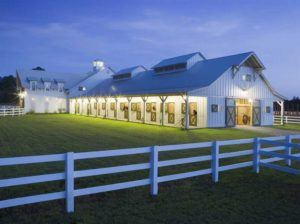
Farm Ranch Estate Insurance Policy
Farm and Ranch Insurance & Estate Insurance made easy AFIG offers a comprehensive line of coverage for all of today's farming operations, big or small.
 www.eqgroup.com
www.eqgroup.com
simme
Old Dumb Guy
Non GMO feed may be difficult to source. Corn and soybeans are used in animal feed. 90% + of all the corn and soybeans produced in the US are GMO varieties. Why is that? What is the purpose or benefit of GMO? GMO corn and soybeans are modified to be resistant to certain herbicides (weed and grass killers). Why is that important? Prior to GMO, cropland was plowed/tilled to kill all existing plants and vegetation prior to planting a crop. That process uses a lot of fuel, a lot of labor, contributes to pollution, lessens air quality, takes more time and money, decreases soil moisture, lessens the health of the soil, allows conditions for loss of soil due to wind and rain (LOTS of soil in many cases from runoff and erosion). Soil loss is never good. There is no real loss, it just goes into the water and streams and ends up somewhere else. Then the crop was planted into the tilled soil. As grasses and weeds emerge, they must be removed to allow the crop to thrive and produce for harvest. That requires more soil disturbance by using field hands (people) with hoes to chop the weeds or tractors with cultivators (mini-plows of sorts) to till the soil again to remove the weeds and grass. That process again uses a lot of fuel, contributes to pollution, lessens air quality, takes more time and money, decreases soil moisture, lessens the health of the soil, allows conditions for loss of soil due to wind and rain. That process would be repeated multiple times until the crop formed a large enough canopy over the soil to shade the ground and inhibit new grass and weed emergence.
GMO crops allow the farmer to plant a crop into the previous year's stubble without tilling the soil or with minimum tillage of the soil - avoiding many of those extra costs and damages to the soil, air and water that the old methods of farming produced. As weeds and grasses emerge, the crop is sprayed with an EPA approved herbicide that kills the weeds and grasses, but does not damage the crop. With less fuel, less pollution, less damage to the environment, better soil health and other good effects. Spraying uses far less fuel and smaller equipment than cultivating resulting in much less impact on environment. Those are the advantages of GMO crops.
I know of a chicken company that started producing non-gmo chickens. Sounds good to some people. If there is a demand for a product and the company can get a premium for that product, economics might say to produce that non-gmo chicken. They had problems buying and getting delivery on enough non-gmo corn and soybean meal to keep the chickens fed and found that the economics were not working in their favor. They stopped producing non-gmo chickens.
You may already know and understand all this. But I wanted to point out that there are advantages to GMO including positive effects on natural resources and environment. What do you see as the attraction to non-gmo fed beef?
GMO crops allow the farmer to plant a crop into the previous year's stubble without tilling the soil or with minimum tillage of the soil - avoiding many of those extra costs and damages to the soil, air and water that the old methods of farming produced. As weeds and grasses emerge, the crop is sprayed with an EPA approved herbicide that kills the weeds and grasses, but does not damage the crop. With less fuel, less pollution, less damage to the environment, better soil health and other good effects. Spraying uses far less fuel and smaller equipment than cultivating resulting in much less impact on environment. Those are the advantages of GMO crops.
I know of a chicken company that started producing non-gmo chickens. Sounds good to some people. If there is a demand for a product and the company can get a premium for that product, economics might say to produce that non-gmo chicken. They had problems buying and getting delivery on enough non-gmo corn and soybean meal to keep the chickens fed and found that the economics were not working in their favor. They stopped producing non-gmo chickens.
You may already know and understand all this. But I wanted to point out that there are advantages to GMO including positive effects on natural resources and environment. What do you see as the attraction to non-gmo fed beef?
Last edited:
Rancher
Well-known member
- Joined
- Apr 2, 2011
- Messages
- 275
- Reaction score
- 366
Very well stated, I'm another "dumb old guy"
Dave
Well-known member
The chicken its self is non GMO. I have yet to see or hear of a chicken that is GMO. It is funny because I see things which are advertised as non GMO when there is no GMO variety of that particular species. Non GMO water melon, I don't believe there is a GMO water melon.
Agreed, it is very hard to find non GMO corn in bulk these days.Non GMO feed may be difficult to source. Corn and soybeans are used in animal feed. 90% + of all the corn and soybeans produced in the US are GMO varieties. Why is that? What is the purpose or benefit of GMO? GMO corn and soybeans are modified to be resistant to certain herbicides (weed and grass killers). Why is that important? Prior to GMO, cropland was plowed/tilled to kill all existing plants and vegetation prior to planting a crop. That process uses a lot of fuel, a lot of labor, contributes to pollution, lessens air quality, takes more time and money, decreases soil moisture, lessens the health of the soil, allows conditions for loss of soil due to wind and rain (LOTS of soil in many cases from runoff and erosion). Soil loss is never good. There is no real loss, it just goes into the water and streams and ends up somewhere else. Then the crop was planted into the tilled soil. As grasses and weeds emerge, they must be removed to allow the crop to thrive and produce for harvest. That requires more soil disturbance by using field hands (people) with hoes to chop the weeds or tractors with cultivators (mini-plows of sorts) to till the soil again to remove the weeds and grass. That process again uses a lot of fuel, contributes to pollution, lessens air quality, takes more time and money, decreases soil moisture, lessens the health of the soil, allows conditions for loss of soil due to wind and rain. That process would be repeated multiple times until the crop formed a large enough canopy over the soil to shade the ground and inhibit new grass and weed emergence.
GMO crops allow the farmer to plant a crop into the previous year's stubble without tilling the soil or with minimum tillage of the soil - avoiding many of those extra costs and damages to the soil, air and water that the old methods of farming produced. As weeds and grasses emerge, the crop is sprayed with an EPA approved herbicide that kills the weeds and grasses, but does not damage the crop. With less fuel, less pollution, less damage to the environment, better soil health and other good effects. Spraying uses far less fuel and smaller equipment that cultivating resulting in much less impact on environment. Those are the advantages of GMO crops.
I know of a chicken company that started producing non-gmo chickens. Sounds good to some people. If there is a demand for a product and the company can get a premium for that product, economics might say to produce that non-gmo chicken. They had problems buying and getting delivery on enough non-gmo corn and soybean meal to keep the chickens fed and found that the economics were not working in their favor. They stopped producing non-gmo chickens.
You may already know and understand all this. But I wanted to point out that there are advantages to GMO including positive effects on natural resources and environment. What do you see as the attraction to non-gmo fed beef?
Hpacres440p
Well-known member
I think the seedless varieties are technically considered GMO. Hard to find seeded watermelon commercially anymoreThe chicken its self is non GMO. I have yet to see or hear of a chicken that is GMO. It is funny because I see things which are advertised as non GMO when there is no GMO variety of that particular species. Non GMO water melon, I don't believe there is a GMO water melon.
Dave
Well-known member
Is it really non GMO or are just using that language as a selling point. Just a few years ago there was only about 6 crops which were GMO. I use to be able to list them. It costs a lot of money to create a GMO species. I would think that watermelon is a small enough specialty crop that it wouldn't pay the companies enough to invest in creating a GMO version. And I know I was eating seedless watermelon back before there was any talk of GMO. I think they created them the old fashion way, plant breeding.
Dave
Well-known member
I did an internet search on GMO. This is the list of GMO I found.
How many plants have GMOs?
In the United States there are 11 commercially available genetically modified crops in the United States: soybeans, corn (field and sweet), canola, cotton, alfalfa, sugar beets, summer squash, papaya, apples and potatoes.
How many plants have GMOs?
In the United States there are 11 commercially available genetically modified crops in the United States: soybeans, corn (field and sweet), canola, cotton, alfalfa, sugar beets, summer squash, papaya, apples and potatoes.
I can't believe tomatoes are not genetically modified they are perfect and bright red.
Ours homegrown tomatoes look normal compared to store bought that are perfect.
Ours homegrown tomatoes look normal compared to store bought that are perfect.
I think the problem with tomatoes is that the cost of genetically modifying them is not justified based on the market. Genetic modification is really no different than taking several years and generations of cross-breeding to produce hybrid varieties. It is much the same as what we do with cattle, only they short-cut the process in the lab.I can't believe tomatoes are not genetically modified they are perfect and bright red.
Ours homegrown tomatoes look normal compared to store bought that are perfect.
If ya wanna come to East TN. I have some going end of September.I live in the Oklahoma City area and I'm looking for suggestions of Rancher's that sell their farm raised beef. I want grass fed from an organic program and no GMO feed. Are there any in my area?
BJ Taylor
Here's what they eat.
Attachments
We hear allot about grass fed cattle that are GMO and antibiotic free these days. I can understand the antibiotic free part if your worried about that stuff. I can also understand the grass fed part if you like a leaner beef. I cannot understand the non GMO though. I've researched GMOs and can't find anything that is bad but when you ask some people about why non GMO they'll go on a 15 minute rant to nowhere. Reminds me allot of the regenerative farming group.
Try Crispin grass fed Murray Grey beef. Probably have to get on a waiting list. They are headquartered in Thomas, OK
I live in the Oklahoma City area and I'm looking for suggestions of Rancher's that sell their farm raised beef. I want grass fed from an organic program and no GMO feed. Are there any in my area? Wallace and Kay Crispin
BJ Taylor
Travlr
Well-known member
Is anyone else having issues with the site being VERY slow?
Last edited:
Travlr
Well-known member
Do you avoid gluten too?I live in the Oklahoma City area and I'm looking for suggestions of Rancher's that sell their farm raised beef. I want grass fed from an organic program and no GMO feed. Are there any in my area?
BJ Taylor
Silver
Well-known member
I am. Tried different browsers, no luck. Thought it was me but other sites work fineIs anyone else having issues with the site being VERY slow?
